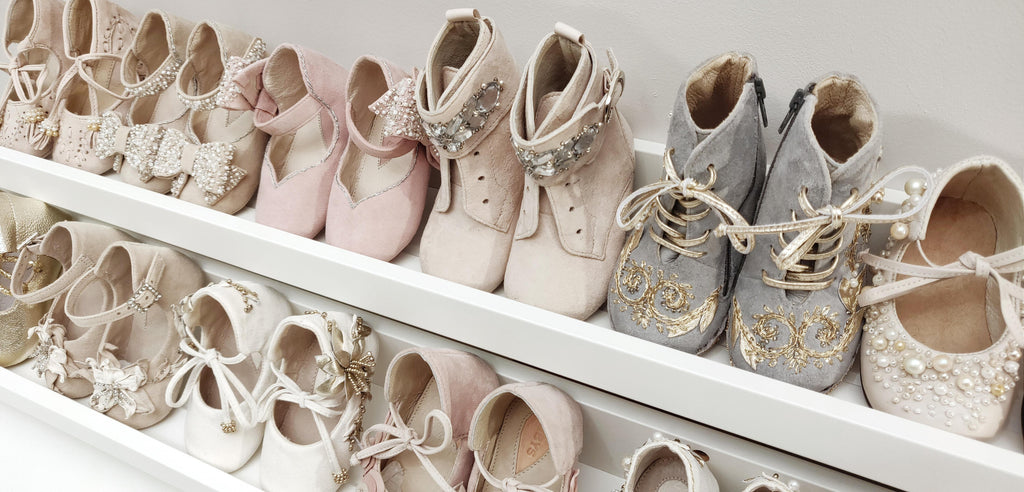Simple steps to measure your little ones feet and getting the perfect shoe size.
What size baby shoes should I buy?
This is usually one of the first questions that pop into mind when choosing the very first booties for your baby. Specially when buying them online. First of all, baby shoes should be around a finger width (1 cm, that's around 0.4 inches) or a bit more larger than the feet, when measured from heel to the top of the big toe. That gives your baby a good toe wiggle and growth room.
Measuring your baby's feet the right way
An easy way to measure your child's foot is to place the foot on a piece of paper, push the edge of the paper towards a wall and place the foot on the paper with child's heel against the wall. Draw a line in front of child's longest toe – now all you have to do is use a ruler to measure the distance. It is very important that your child stands up during measurement, since the foot extends a couple of millimetres when carrying the bodyweight. It’s also a good idea to measure both feet since one foot many times is a little bit bigger than the other.
To make it really simple, remember these 2 steps when measuring your baby's feet:
- Measure your child's feet from the heel to the top of the longest toe.
- When you know the length of the foot, add margin for growth to that measurement depending on what type of shoe you’re looking for.
Different Margin for Growth for Different Types of Shoes
- Open sandals, about 1 cm
- Closed shoes and thinlined spring/autumn boots, about 1-1,5 cm
- Warmlined boots, 1,5-2 cm
When you think the shoe is too small, then order the next size up. Your baby will grow into them in no time.
Ok, that's all good but how do I know which baby shoe size that actually is?
In stores you don't see shoe sizes in inches or centimetres, you see them in different numbers.
Don't worry, the following chart will help you out. This, of course is our own Vibys baby shoe size guide, but you can use it as a general guideline for other brands as well.
| EU size | US size | UK size | Approx. inner sole length | Approx. age |
|---|---|---|---|---|
| 16 | 1 | 0 | 10 cm / 3.94 in | 0-3 months |
| 17 | 2 | 1 | 10.5 cm / 4.13 in | 3-6 months |
| 18 | 3 | 2 | 11 cm / 4.33 in | 6-9 months |
| 19 | 4 | 3 | 11.5 cm / 4.53 in | 9-12 months |
| 20 | 5 | 4 | 12.5 cm / 4.92 in | 12-15 months |
| 21 | 5.5 | 4.5 | 13 cm / 5.12 in | 12-18 months |
| 22 | 6 | 5 | 13.5 cm / 5.31 in | 18-24 months |
| 23 | 7 | 6 | 14.5 cm / 5.71 in | 2 years or older |
| 24 | 8 | 7 | 15 cm / 5.91 in | |
| 25 | 9 | 8 | 15.5 cm / 6.1 in | |
| 26 | 9.5 | 8.5 | 16.5 cm / 6.5 in |
Making sense of our baby shoe size guide
In one word, it usually comes down to the materials thickness: shoes from thinner and softer leather usually have more room inside them than the ones made from thicker leather and warm lining although both of them look exactly the same size outside.




